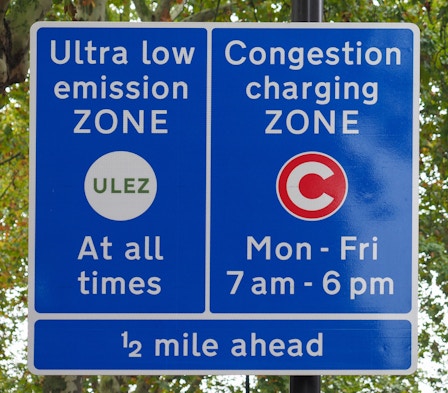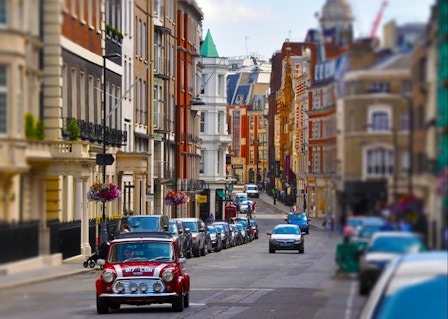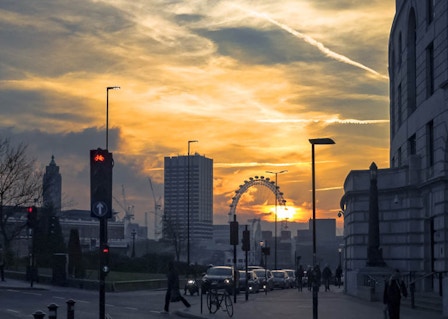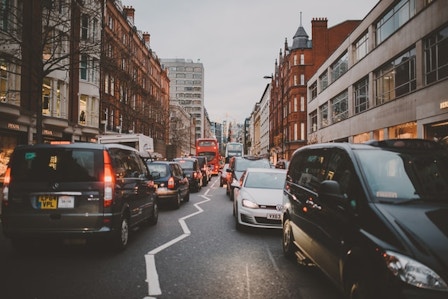Check ULEZ compliance for free
London’s ULEZ operates city-wide up to the M25. Use our ULEZ checker to find out if your car meets emissions standards and what fees you may need to pay.
How does the ULEZ checker tool work?
Using data from the DVLA and emissions standards published by TfL, our ULEZ checker tool uses your vehicle’s reg to check if your car meets the Euro emissions standards that qualify it as low-polluting. We can then confirm if your vehicle is compliant or non-compliant. Only non-compliant vehicles need to pay daily charges to drive in the ULEZ.
The compliance results are based on the ULEZ standards published by TfL, but we do not guarantee their accuracy. To check compliance for older vehicles, we advise you to use the TfL vehicle checker on the TfL website.
Some vehicles are exempt from ULEZ charges and may not receive an accurate compliance result from our checker. These include some vehicles built before 1 January 1973, or with historic tax class, some specialist vehicles (including tractors, mowers, farm and construction machinery), and those operated by the Ministry of Defence.

What is the London ULEZ?
London’s Ultra-Low Emission Zone (ULEZ) was introduced by TfL in 2019 as a small zone in Central London and aimed to reduce air pollution in the city by charging drivers of the worst polluting vehicles a fee to drive within the zone.
TfL expanded the zone in October 2021 to cover an area up to the North and South Circular Road. As part of an ongoing effort to further reduce vehicle emissions across the capital, the zone was expanded again to cover the whole of Greater London on 29th August 2023.
Drivers of non-compliant cars are charged £12.50 per day if they make a journey within the ULEZ. With automatic fines for non-payment, make sure you don’t get caught out.
Read our guides for more info about London’s ULEZ expansion, the latest ULEZ charges & fines, and ULEZ scrappage schemes.
Which cars are free from ULEZ charges?
Different rules apply to different types of vehicles when it comes to ULEZ fees. For the most part, this means:

ULEZ compliant petrol cars
- Must meet Euro 4, Euro 5 or Euro 6 emissions standards
- Were generally registered after January 2006

ULEZ compliant diesel cars
- Must be Euro 6 compliant
- Were generally registered after September 2015

ULEZ compliant hybrid & electric cars
- With diesel engines: Must meet Euro 6 standards
- With petrol engines: Must meet Euro 4 standards


ULEZ compliant vans & motorbikes
- Diesel vans must be Euro 6 compliant
- Petrol vans must be Euro 4 compliant
- Motorbikes must be Euro 3 compliant
ULEZ scrappage scheme
Prefer to scrap your vehicle? The ULEZ car and motorcycle scrappage scheme is available for households within Greater London that own a non-ULEZ-compliant vehicle.
If you qualify, you can receive:

for scrapping a motorcycle or moped

for scrapping a car
Frequently asked questions about London's ULEZ
What is the Ultra Low Emission Zone? (ULEZ)
What is the Ultra Low Emission Zone? (ULEZ)
The ULEZ is a zone operated by TfL in London that restricts the use of older, high-polluting vehicles through the use of a penalty fee. If your car is not ULEZ compliant, you need to pay a daily charge of £12.50.
Where does the ULEZ charge apply?
Where does the ULEZ charge apply?
Since the 29th August 2023, ULEZ has been operating city-wide up to the M25.
This means that any motorist driving a non-compliant car within Greater London will be charged.
How do I know if I have to pay the ULEZ charge?
How do I know if I have to pay the ULEZ charge?
If you have driven into the ULEZ in a car that is not compliant, TfL will be in touch to let you know you face a ULEZ charge. The ULEZ area is policed through automatic number-plate recognition (ANPR), meaning you won’t be physically stopped from entering the ULEZ in a non-compliant vehicle, but you will receive a penalty charge notice of £160 if you haven’t paid by midnight of the third day since your journey.
Alternatively, our ULEZ checker can tell you if your vehicle will need to pay the ULEZ charge, just enter your reg above!
Which cars are free to drive in the ULEZ?
Which cars are free to drive in the ULEZ?
Cars that are free to drive in the ULEZ must be Euro 6 (diesel) or Euro 4 (petrol) compliant. That means low emission and zero-emission vehicles such as electric cars will not be charged. Hybrid cars aren’t automatically exempt, as some models made before 2015 may not be ULEZ compliant.
How can I check if my car is ULEZ compliant?
How can I check if my car is ULEZ compliant?
By using our ULEZ checker! Just enter your reg to see if your vehicle is ULEZ compliant.
Using DVLA and emissions standards information published by TfL, we will show you if your car is exempt from charges in London, or whether you need to pay a daily charge to drive in the zone.
Where is the ULEZ?
Where is the ULEZ?
The ULEZ was expanded city-wide on the 29th of August 2023. This means that any motorist driving a non-compliant vehicle within any London borough is now subject to the ULEZ charge.
Is my vehicle Euro 6 compliant?
Is my vehicle Euro 6 compliant?
You can check your vehicle for Euro 6 compliance in relation to ULEZ with Motorway’s ULEZ checker.
If your vehicle was made after September 2015, there’s a good chance it’s Euro 6 compliant and therefore able to drive in London’s ULEZ for free.
You may also find this information in your registration details or, you can simply check your reg with our ULEZ check tool which will show whether it’s Euro 6 compliant.
If your car is ULEZ compliant then it will automatically mean it’s Euro 6 compliant too (excluding exemptions).
Is my bike Euro 3 compliant?
Is my bike Euro 3 compliant?
If your bike is Euro 3 compliant then it will also be considered ULEZ compliant — enter your reg into our checker to find out.
Is my bike Euro 5 compliant?
Is my bike Euro 5 compliant?
From the start of 2021, only Euro 5 compliant bikes can be sold in the EU, so any motorbikes bought at this time will be both Euro 5 and ULEZ compliant. If you purchased a bike before this, you should check your registration details or contact the manufacturer to confirm.
Remember, the rules for bikes in the ULEZ means they must be Euro 3 compliant, not Euro 6, like cars, so bikes manufactured as early as 2000 may still be able to drive in the ULEZ charge-free.
Where was ULEZ expanded to in 2023?
Where was ULEZ expanded to in 2023?
London’s ULEZ was introduced by TfL in 2019, and was later expanded to cover an area up to the North and South Circular Road. Since the 29th August 2023, the zone has been operating city-wide up to the M25.
If your car is ULEZ compliant, you will not need to pay any ULEZ fees within this expanded area, but if you are driving a non-compliant vehicle, you will be subject to the full ULEZ charge.
Use Motorway’s ULEZ checker to find out if your car meets the emissions standards, and if you need to pay in the Greater London zone.
When did the ULEZ expand?
When did the ULEZ expand?
Since the 29th of August 2023, driving a non-compliant vehicle within any Greater London borough will make you subject to the ULEZ charge.
Read our guide to find out how this expansion affects you, the price of your vehicle, and what you can do to avoid paying ULEZ fines.
How do I know if I’ve entered the ULEZ?
How do I know if I’ve entered the ULEZ?
The ULEZ is clearly signposted as you enter the capital. Keep an eye out for the green signs with ULEZ written in a white circle. These will be at every boundary point.
Look out for the advance information signs that appear on major roads. These indicate the distance to the boundary.
When you get close to the boundary, there will be directional signs that show which routes take you into the ULEZ.
You’ll also see signs in the zone displaying a camera icon. These are to remind you about the cameras – equipped with Automatic Number Plate Recognition (ANPR) technology – operating in the zone.
How much is the ULEZ charge?
How much is the ULEZ charge?
The ULEZ (Ultra Low Emission Zone) charge amount depends on several factors, including the type of vehicle, its emissions, and the location.
Since September 2021, the ULEZ charge in London has been £12.50 for most non-compliant vehicles. This includes cars, motorcycles, and vans.
The ULEZ charge applies 24 hours a day, every day of the year, including weekends and holidays, except for Christmas Day (25th December). This means that vehicles entering the ULEZ area are subject to the charge at any time, day or night.
You can read more about ULEZ charges in our guide, including how to pay a ULEZ charge.
How is the ULEZ enforced?
How is the ULEZ enforced?
ULEZ enforcement involves monitoring vehicles within the designated zone to ensure compliance with emission standards. Cameras equipped with Automatic Number Plate Recognition (ANPR) technology are installed at various entry points and key locations throughout the zone. These cameras capture the number plates of passing vehicles and cross-reference them with a database of vehicle details and their corresponding emission levels.
How do I pay the ULEZ charge?
How do I pay the ULEZ charge?
There are several ways to pay the ULEZ charge. Transport for London (TfL) has a free AutoPay system that covers ULEZ, LEZ, and the Congestion Charge. You can also pay online on a journey-by-journey basis, on TfL’s ULEZ payment portal. Read more about ULEZ charges in our guide.
What cars are exempt from ULEZ?
What cars are exempt from ULEZ?
There are certain types of vehicles that are exempt from ULEZ charges, including electric vehicles, plug-in hybrid vehicles, Euro 6 compliant diesel vehicles, Euro 4 compliant petrol vehicles, and electric motorcycles and scooters. You can find the full list of exempt vehicles in our guide.
How much will I get from ULEZ scrappage schemes?
How much will I get from ULEZ scrappage schemes?
On 22nd August 2023, the Mayor of London, Sadiq Khan, established a £2,000 ULEZ scrappage grant to all Londoners with non-compliant vehicles.
The scheme will be available to any household with a non-compliant car or motorcycle. The scheme is expected to cost around £160m. Check the ULEZ scrappage grant amounts by vehicle type in our guide.
What are the details of the ULEZ scrappage scheme in 2023?
What are the details of the ULEZ scrappage scheme in 2023?
The ULEZ scrappage scheme in 2023 is a government initiative aimed at encouraging the replacement of older, more polluting vehicles with cleaner, low-emission vehicles.
The scheme provides financial incentives to eligible vehicle owners to scrap their older vehicles and switch to newer, more environmentally-friendly alternatives. Read more about it in our guide.
Is my van liable for ULEZ, LEZ, and the Congestion Charge?
Is my van liable for ULEZ, LEZ, and the Congestion Charge?
The liability for ULEZ charges depends on the emission standard of your van. If your van doesn’t meet the required emission standards for ULEZ (e.g. Euro 4 for petrol and Euro 6 for diesel vehicles), it will be subject to daily charges when driving within the ULEZ zone. You can find more information in our van driver’s guide to ULEZ.





